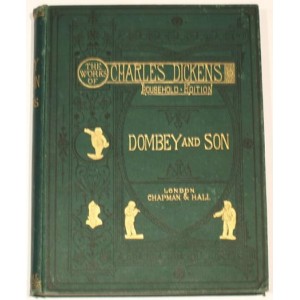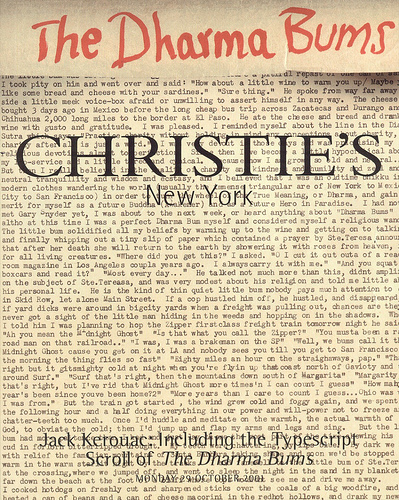
I’m just now beginning to emerge from two years of living in the desert, the howling waste of inwardness that is caused by the box canyon of life.
I’m coming out of it.
In addition to the New Testament, ten books, in particular, have proven sustaining to me in the wilderness. If you read Mockingbird, many of them will be familiar to you. But I wanted to list them here, in one place, for the readers and supporters of Mockingbird, in hopes of their being useful to you. “For you the living, this Mash was meant, too.”
Each work, and three of them are short stories and one of them, a play, can be found easily, on the Internet or on Amazon. One of them, the last, is harder to find.
1. Dombey and Son – Charles Dickens
 Dickens wrote this from 1846 to 1848. It has everything: enduring and finally triumphant Christian meekness in two important characters; the great story of mercy on a very wrong man, in the recovery of Paul Dombey, Sr.; the ‘cosmic’ dimension of monistic Reality in the addresses of little Paul Dombey, Sr., to the sea; and the happy intrusion of comic absurdity in one secondary character, who just keeps on getting better.
Dickens wrote this from 1846 to 1848. It has everything: enduring and finally triumphant Christian meekness in two important characters; the great story of mercy on a very wrong man, in the recovery of Paul Dombey, Sr.; the ‘cosmic’ dimension of monistic Reality in the addresses of little Paul Dombey, Sr., to the sea; and the happy intrusion of comic absurdity in one secondary character, who just keeps on getting better.
I think there is one weakness in the novel: the self-righteousness of the second Mrs. Dombey, although justified by her terrorized life, takes up too many pages, almost like “filler.” But you sure have to feel for the character.
Dombey and Son does justice to grace, and does magnificent justice to the final Oneness of life.
2. The Dharma Bums – Jack Kerouac
I think some people have this novel wrong. Its “Eastern” content is constantly being complicated by Kerouac’s Christian persona. Every time the North Woods “Buddhist” character, ‘Japhy Ryder’, gets carried away by his doctrinal Buddhism, Kerouac’s character, ‘Ray Smith’, takes Ryder on, from a Christian angle. This occurs in connection with the memorable encounter with the African-American evangelist in San Francisco, and in connection with the suicidal girl who is “freaking out” in the apartment from the roof of which she later jumps. Note the author’s non-intrusive Christian references, right from the start, when the bum on the train speaks of Saint Teresa.
 I think the last few pages of The Dharma Bums are some of the most peaceful and sweet words ever composed. “Blessed are the peacemakers, for they shall be called the children of God.”
I think the last few pages of The Dharma Bums are some of the most peaceful and sweet words ever composed. “Blessed are the peacemakers, for they shall be called the children of God.”
3. “The Green Pastures” – Marc Connelly
This 1930 play, written by agnostic Episcopalian Marc Connelly, is one of the best evocations of Christian grace I know. “The Green Pastures”, now almost never performed because of its supposedly non-politically correct setting, is a Biblical Theology for the stage. It is a Biblical Theology that documents with humor and never-failing compassion the march of God towards a position of Grace in relation to His fallen creation: men and women. In “The Green Pastures” God’s “mind” oddly requires changing. Before you say, “Heav’n forfend!”, read the play. Or, easier, rent the movie version, from 1936, which was directed by Marc Connelly. “The Green Pastures” is the best material I can think of for a parish movie night. But forget about it. You’ll never get away with showing it. Quel Total Dommage !
4. Guard of Honor – James Gould Cozzens
This is James Gould Cozzens’ Pulitzer Prize winning novel of 1948. Cozzens wrote in 1977 that it had taken a World War to pry him away from his hermit’s life in Lambertville, N.J. This book tells us WWII succeeded, at least with James Gould Cozzens.
Guard of Honor tells the story of what happens during three days on an Air Force base near Orlando during the build-up to the invasion of France. We never leave Florida! Yet many have called this the best novel to emerge from World War II about World War II.
 I like Guard of Honor because it tells the truth about people, and asks all the big questions about meaning and futility and God. When you get to the chapter on the Saturday afternoon “Review” at Ocanara Air Force Base, you’ll be so deep in John Milton, Fulke Greville, and the King James Version of the Bible, that you’ll want to put up a tent and live there for the rest of your life. I often say to Mary, when we are sitting out on the dock at “the Lake”, “Oh, Mary, look! A Guard of Honor sky.” She smiles.
I like Guard of Honor because it tells the truth about people, and asks all the big questions about meaning and futility and God. When you get to the chapter on the Saturday afternoon “Review” at Ocanara Air Force Base, you’ll be so deep in John Milton, Fulke Greville, and the King James Version of the Bible, that you’ll want to put up a tent and live there for the rest of your life. I often say to Mary, when we are sitting out on the dock at “the Lake”, “Oh, Mary, look! A Guard of Honor sky.” She smiles.
5. Theophilus North – Thornton Wilder
This is still my favorite one of Wilder’s novels. Mockingbird readers will know about this one. What I appreciate about Theophilus North is the prototype it offers for pastoral ministry. ‘Theophilus’ is a detective, a wag, a minister of grace, a magician, a philosopher, and a sort of now-you-see-him, now-you-don’t shaman. He heals people, to put it plainly, by means of love. I haven’t met anyone yet who hasn’t just lit up, after they read it, when the spell Theophilus North was cast, in conversation.
6. The Disappearance – Philip Wylie
If you agree with me that the subject of sex is Christianity’s nightmare, then you’ve got to break down and read Philip Wylie’s 1951 fantasy (sort of, fantasy) entitled The Disappearance. This writer understood about sex. He seems, very oddly, to have understood about sex “just about as fer as you can go”. Men are panned, men are loved; women are panned, women are loved. No one gets off. But everybody gets off. A great line is this — it’s actually from another Wylie book, but it’s the whole story of The Disappearance: “The scream of sex is for reconciliation.”
7. By Love Possessed – James Gould Cozzens
I have read this book four times through, and still can’t understand how it became the literary sensation of 1957. The style of the book is baroque, the story is realistic (No Denial!), and the over-all message of the book is in favor of acquiescence to reality rather than fighting it. The book is intellectual and completely non-patronizing to the reader.
So why was it the literary sensation of 1957? It must have been because of the two sex-scenes, both of which are restrained from the viewpoint of today.
I think By Love Possessed is about all of life, and the credible possibility of hope within the day-to-day. The novel also understands the Episcopal Church, from the inside out and in depth. It’s hard to imagine how you could ever get enough of this all-seeing eye known as By Love Possessed.
 8. “The Lord Provides” & “A Beautiful Evening” – both taken from The Works of Irvin S. Cobb: Old Judge Priest
8. “The Lord Provides” & “A Beautiful Evening” – both taken from The Works of Irvin S. Cobb: Old Judge Priest
In his “Judge Priest” stories, which were later made into two wonderful movies, both directed by John Ford, Cobb portrayed a small-town judge whose approach to life, and especially justice, is the approach taken by Christ Himself.
This particular tale is the story of a prostitute’s funeral in “Fairfield, KY” (aka Paducah). When people ask me to sum up the Gospel in a short story, I either give them “The Lord Provides” or “The Gardener”, by Rudyard Kipling. The latter is more subtle, maybe; but they both do the job.
“A Beautiful Evening” is also from 1916. In it, a most remarkable and unexpected reconciliation occurs between two offended people, which is precipitated, well, literally, by the Providence of God. I had to read “A Beautiful Evening” three times in order to actually understand the story it tells. When I finally did, I could only say: O. M. G.
Both of these stories can be purchased in the same “internet edition” and just three clicks away from here.
9. “Black and White” – Irvin S. Cobb
Can you stand it? Another one by Irvin S. Cobb ! It’s the last entry in the 1912 collection of “Judge Priest” stories entitled Back Home. You’ll have to find this one on eBay [or read it on Google Books], tho’ I may just type it up some “Hot August Night” and make it available through Mockingbird. It’s that good.
“Black and White”, which concerns some events during the annual August day in Paducah in which the African-American community there celebrates the Emancipation Proclamation, seems like a tale of changing race relations in a small Southern town. And it is that. Or maybe it’s about sacrificing love, in the event from the Civil War that is the ‘back story’ of the piece — a very powerful and affecting event.
But I think Cobb’s story is mainly about change, and growing old. How does ‘Judge Priest’ and his ancient Confederate Army veteran friends adapt to social change — and to growing old? Not particularly well. This is the pathos of the tale, and it concerns Black and White — and all of us.
10. The Razor’s Edge – W. Somerset Maugham
Somerset Maugham’s 1944 opus on religion is sincere, noble, and telescopic of life. Larry Darrell’s spiritual odyssey takes him straight across the searching landscape of mankind, craving some tangible hope in the face of death. Don’t let anyone else tell you what to think about this book. Read it yourself. It is a true lucerna sub pedibus, a work of inspiration and delight to be read again and again.
Well, those are ten “desert island discs”, but they’re books. Or rather six of them are books, with one play and three short stories included.
These works of literature have spoken volumes to me since I entered the desert in the summer of 2009.
They have truly helped me.
Now, now that I am “Crawling from the Wreckage” (Dave Edmunds), I can offer them to you.
I offer them to you.

COMMENTS













